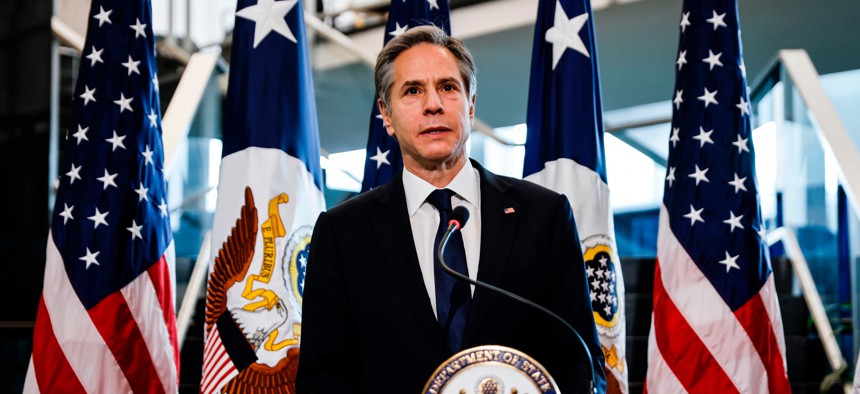
Secretary of State Antony Blinken touted new recruitment and retention efforts within the department, including a 200,000-square-foot training center for the Foreign Service Institute. CARLOS BARRIA / GETTY IMAGES
State Dept. expands capacity for training and onboarding amid hiring surge
Middle East war demonstrates need for a competent diplomatic workforce, State Secretary Antony Blinken says.
The State Department is ramping up its education and training programs as it brings on a surge of new employees, establishing new curriculums and facilities to advance the initiative.
The department, in fiscal 2023, just completed its largest hiring spree in more than a decade, State Secretary Antony Blinken said on Monday, reversing a trend of understaffing that had in turn led to underinvesting in training. As State struggled to fill its needs for day-to-day operations, it maintained an insufficient workforce to pull its people out of their daily duties to instead focus on continuous learning efforts. Now that it is regaining some of the staff it shed in recent administrations, the department is expanding its capacity to onboard and train those workers.
Blinken delivered his remarks at a new building on the campus of the Foreign Service Institute, State’s training center for foreign affairs officials throughout government. The 200,000-square-foot building expanded FSI’s footprint by 25% and Blinken said “from top to bottom” it was “tailor-made to address the learning and training needs of our entire workforce.” As challenges throughout the globe evolve at a faster pace than he has seen in his decades-long career, Blinken said, the new center will be “fit for purpose” in the 21st century. It is equipped with everything from lecture halls for new foreign service officer classes entering their six months of initial training to mock jails and consular windows to give employees experience before deploying to the field.

The secretary boasted of his efforts to improve working conditions for the department’s employees, including launching a new policy ideas channel, reinvigorating its dissent channel, creating a global base pay rate for all locally employed staff at embassies around the world and expanding eligibility for student loan repayment. He has also rolled out a “retention unit” that will look for avenues to convince employees to have long-term careers at State.
The team will allow the department to “better understand and enhance our people's experience so that we win one of the most important competitions that we're engaged in, and that's the competition for talent,” Blinken said.
FSI Director Joan Polaschik said the retention unit has gleaned data that one of the lead drivers of employees leaving State is the lack of professional development opportunities. Historically, she said, the department was good at training employees when they first onboarded or when they entered senior management at the end of their careers, but had not provided mid-career opportunities.
State has developed a core curriculum of 16 different classes for employees to take over the middle-10 years of their careers, which the director said will build foundational skills and develop expertise in new areas of focus such as climate, cybersecurity, global health security and strategic competition with China.
“There is a really strong nexus, I would say, to the work that we're doing with training,” Polaschik said of the larger retention efforts. “How do we create that environment where people have all the opportunities to learn that they really need not just to be successful at their jobs, but to feel fulfilled as employees. So it's exciting to have this data and to figure out the way to better address it.”
Blinken, who recently returned to the country after a whirlwind of travel throughout the Middle East, stressed the current war between Israel and Hamas in Gaza has demonstrated the need for a well-trained diplomatic workforce.
“Over the past few weeks, amidst the terror, the violence, the suffering that's unfolding in the Middle East, we have seen how important a nimble, empowered diplomatic workforce is,” Blinken said. “They've been working around the clock under tremendous pressure to shape our policy, to inform our understanding, to lead our diplomatic engagement with key partners [and] to advance key goals of the United States.”
Those have included, according to Blinken, assisting Israeli defense, working to secure the release of hostages held by Hamas, addressing the humanitarian crisis in Gaza, helping to get civilians out of harm’s way and providing assistance to those who need it.
Polaschik acknowledged her expanded capacity at FSI could bring varying results down the line as the interest in growing and training State’s workforce “ebbs and flows” from administration to administration. Under President Trump, for example, State shed 10% of its civil service employees. She expressed confidence, however, that the institute will be more adaptive to the nation’s national security objectives. In the past, she noted, State primarily focused on educating foreign service officers in language development, but technology could make that obsolete in the future.
“I'm excited about the opportunity to look again at the fundamentals that we have relied on for so long,” Polaschik said.







